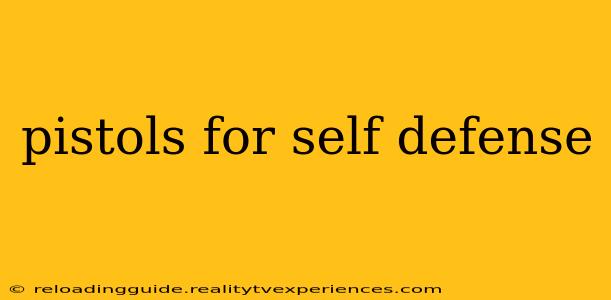Choosing a pistol for self-defense is a significant decision, demanding careful consideration of various factors beyond just firepower. This guide delves into the crucial aspects to help you make an informed choice, ensuring your safety and responsible firearm ownership. We'll explore different pistol types, calibers, features, and training considerations, empowering you to select the best self-defense pistol for your individual needs and circumstances.
Understanding Your Needs: The Foundation of Self-Defense Pistol Selection
Before diving into specific models, it's crucial to honestly assess your personal situation and needs. Several key factors will influence your decision:
-
Physical Capabilities: Consider your hand size, strength, and overall physical fitness. A smaller, lighter pistol might be preferable for individuals with weaker hands or smaller frames, while larger-framed individuals might find larger pistols easier to control. Think about recoil management; a pistol with substantial recoil can be difficult to manage, especially for beginners.
-
Experience Level: If you're a novice, a smaller caliber with less recoil is generally recommended to facilitate comfortable training and safe handling. Experienced shooters might opt for larger calibers or more complex firearm designs.
-
Intended Use and Environment: Where will you primarily use the firearm? A concealed carry pistol needs to be easily concealed and manageable in various situations. Home defense might allow for a larger, more powerful firearm.
-
Legal Considerations: State and local laws vary significantly regarding firearm ownership, concealed carry permits, and the legal use of force in self-defense. Thoroughly research your local laws before purchasing any firearm.
Pistol Types for Self-Defense
Several pistol types are suitable for self-defense, each offering distinct advantages and disadvantages:
1. Semi-Automatic Pistols:
These are the most common type, offering high capacity magazines and relatively easy operation. They are widely available in various calibers and sizes.
2. Revolvers:
Revolvers are known for their reliability and simplicity. They typically have lower capacity magazines but are less prone to malfunctions than semi-automatic pistols.
3. Compact and Subcompact Pistols:
Designed for concealed carry, these pistols prioritize concealability over capacity and often feature smaller calibers.
Caliber Considerations: Choosing the Right Cartridge
The caliber (the diameter of the bullet) significantly impacts the pistol's power, recoil, and accuracy. Popular self-defense calibers include:
-
9mm: A versatile and popular choice, offering a good balance of power, capacity, and recoil management.
-
.45 ACP: A powerful round with significant stopping power, but it features more recoil.
-
.380 ACP: A smaller caliber with less recoil, often preferred for concealed carry by those with smaller hands or less experience.
-
.40 S&W: A middle ground between 9mm and .45 ACP, offering a balance of power and recoil.
Essential Features to Consider:
Beyond the type and caliber, several features enhance a pistol's suitability for self-defense:
-
Sights: Clear and easy-to-use sights are crucial for accurate shooting under pressure. Night sights are particularly beneficial in low-light conditions.
-
Ergonomics: A comfortable grip is essential for accurate and controlled shooting.
-
Reliability: Choose a pistol known for its reliability and minimal malfunctions.
-
Safety Features: Familiarize yourself with the firearm's safety features and practice safe handling techniques.
Training: The Most Crucial Element
No firearm, regardless of its features, is effective without proper training. Regular practice with your chosen pistol is paramount to developing proficiency, accuracy, and safe handling skills. Seek professional training from certified instructors to learn proper techniques, including drawing, aiming, shooting, and the legal aspects of self-defense.
Conclusion: Responsible Self-Defense
Selecting a pistol for self-defense is a deeply personal and responsible decision. This guide provides a framework for your research, highlighting key considerations to make an informed choice. Remember, responsible firearm ownership includes thorough research, proper training, and adherence to all applicable laws and regulations. Prioritize safety and seek professional guidance to ensure you make the best choice for your specific needs.

